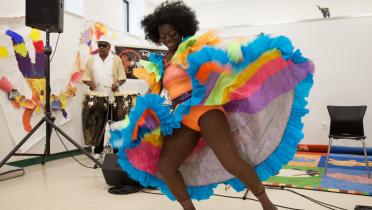Keba Bobo Cissoko in Concert, 1997-1998
Two concert performances by master kora player Keba Bobo Cissoko from June 1997 and May 1998.
This concert was produced as part of the Badenya West African Community Cultural Initiative (CCI) at the Center for Traditional Music and Dance. Keba Bobo Cissoko (1962-2003) was a master of the kora (gourd harp), and major exponent of the jaliya (hereditary singers/bard) tradition from Guinea Bissau. He was noted for an emphatic singing style and florid kora playing. Cissoko was born in the Bafata region of Guinea-Bissau and began learning kora at an early age from family members, including his grandfather, Bouly Gelissa. in 1981, he moved to Conakry, Guinea, where he joined the National Instrumental Ensemble. He also formed his own band, Le Tamalalou ("The Traveler"). In 1986 he met Kemoko Sano, the choreographer of Les Ballets Africains, who widened his musical practice from the jaliya repertoire to the more diverse styles of performance required of a national repertory ensemble, in which performers play several instruments and take dramatic roles from different regions. Cissoko learned to play other instruments, including the dundun bass drum, the djembe and the bala, and in 1989, he joined Les Ballets Africains. After six years in the company he toured Europe and the United States. In 1996, he settled in New York, where he rejoined Les Merveilles d' Afrique. In 1998, he founded a New York-based version of his Le Tamalalou. The band joined jalilu and North AMerican musicians in a combination that translated the western Manden repertoire into an interculturally accessible music. Cissoko was featured in CTMD's Badenya West African Community Cultural Initiative in the late 1990s, and appears on recording Badenya: Manden Jaliya in New York City produced by CTMD for Smithsonian Folkways. (Notes by Tom Van Buren, Ph.D.)

